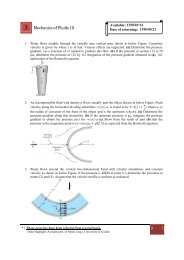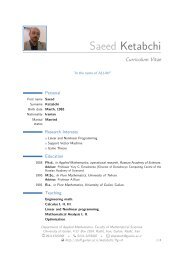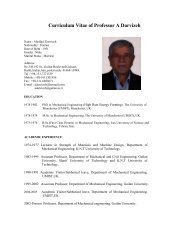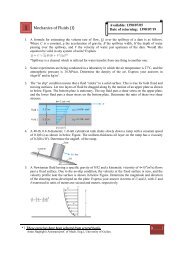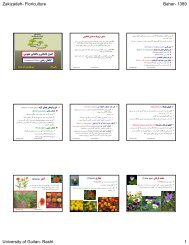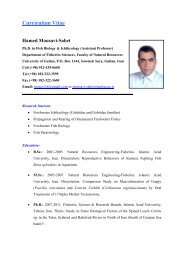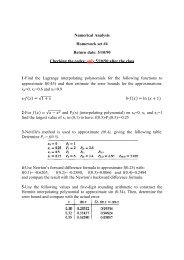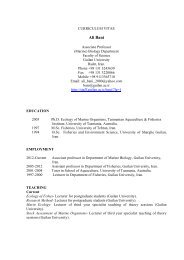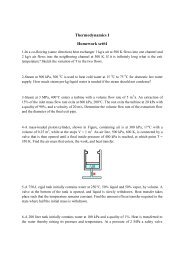Medical Tourism in Developing Countries
Medical Tourism in Developing Countries
Medical Tourism in Developing Countries
- No tags were found...
Create successful ePaper yourself
Turn your PDF publications into a flip-book with our unique Google optimized e-Paper software.
Introduction to <strong>Medical</strong> <strong>Tourism</strong> ● 3and Jordan have also broken <strong>in</strong>to this lucrative market, and more countriesjo<strong>in</strong> the list every year. 6How big is the medical tourism phenomenon <strong>in</strong> develop<strong>in</strong>g countries?Two numbers are relevant: the number of foreign patients there are and theamount of revenue they generate. In 2004, some 130,000 foreign patientsreceived medical treatment <strong>in</strong> Malaysia, 7 and a survey of Malaysian hospitalsfound that there has been a 25 percent rise <strong>in</strong> foreign patients. 8Thailand receives 400,000 foreign medical tourists every year, 9 of which50,000 are Americans go<strong>in</strong>g to a s<strong>in</strong>gle hospital, the Bumrungrad. 10 Cuba<strong>in</strong> 1995–96 treated some 25,000 foreigners. 11 In 2004, 150,000 foreignpatients traveled to India for treatment, 12 while the year before, some50,000 British medical tourists traveled to Thailand, South Africa, India,and Cuba. 13 The number of foreign patients <strong>in</strong> India is grow<strong>in</strong>g by30 percent every year. 14 Jordan expects to receive 100,000 visitors annually.Argent<strong>in</strong>a hopes to <strong>in</strong>crease its <strong>in</strong>flow of medical tourism annually by50 percent. 15 While some 250,000 health tourists come for medical treatmentto the United States every year, Costa Rica, t<strong>in</strong>y by comparison, isable to attract as many as 150,000. 16These foreign patients generate revenue for the countries that host them.For example, private medical care (<strong>in</strong>clud<strong>in</strong>g for foreign consumption) isconsidered one of Mexico’s most profitable economic activities. 17 Healthtourism <strong>in</strong> Cuba generates some $40 million per year. 18 Foreign patientsgenerated some $27.6 million <strong>in</strong> revenues <strong>in</strong> Malaysia <strong>in</strong> 2004. 19 Each yearpeople from Lat<strong>in</strong> America spend up to $6 billion on medical care outsidetheir countries. 20 Moreover, the potential for medical tourism to cont<strong>in</strong>uegenerat<strong>in</strong>g <strong>in</strong>come is perceived to be great. It is estimated that India couldearn as much as $2.2 billion per year from medical tourism by 2012.Perhaps the most tell<strong>in</strong>g estimate of the role of medical tourism <strong>in</strong> Indiacame from Nars<strong>in</strong>ha Reddy, manager of market<strong>in</strong>g for Bombay Hospital, 21who said that medical tourism would do for India’s economic growth <strong>in</strong>the 2000s ten to twenty times what <strong>in</strong>formation technology did for it <strong>in</strong>the 1990s. In addition, a study by Mattoo and Rath<strong>in</strong>dran found that arepresentative health dest<strong>in</strong>ation could earn $400 million annually even iftrade was limited to only 15 procedures. 22What expla<strong>in</strong>s this global <strong>in</strong>crease <strong>in</strong> medical tourism? While demandand supply are discussed <strong>in</strong> chapters 3 and 4, suffice it to say here that thepr<strong>in</strong>cipal reasons for the <strong>in</strong>crease <strong>in</strong> demand are demographic (people areliv<strong>in</strong>g longer), medical (there are <strong>in</strong>creases <strong>in</strong> noncommunicable illnessesthat require the help of a specialist or are elective), economic (people havemore disposable <strong>in</strong>come and sometimes even portable health <strong>in</strong>surance),and social (people know more about the world and are will<strong>in</strong>g to travel).



